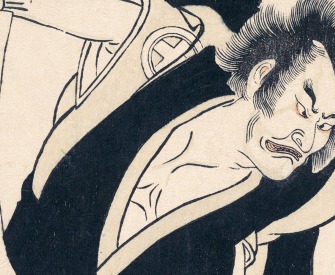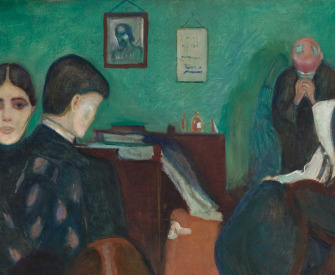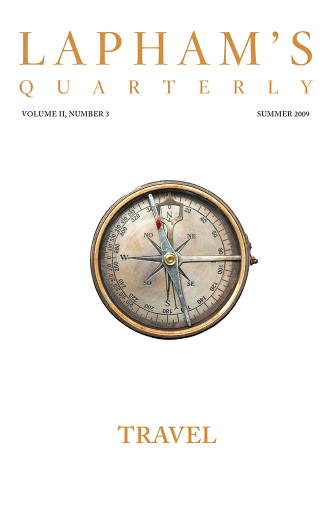Everybody says it; and what everybody says must be true.
—James Fenimore Cooper, 1844The Cleopatra’s Nose of 1914
The story of the Caillaux affair—a murdered newspaper editor, a web of adultery, and the road to World War I.
By Jack Beatty

Newspaper-Stall, Rue de Seine, by James Abbott McNeill Whistler, 1893. Los Angeles County Museum of Art, The Julius L. and Anita Zelman Collection.
I said to myself, “Shall I go to the Figaro offices?”…It was then the idea came to me to cause a scandal…I should explain I was accustomed to carrying a small pistol.
—Henriette Caillaux, testifying at her trial
From a muff linking the sleeves of her fur coat, the lady pulled an automatic pistol and fired. The editor who was her target sought cover beneath his desk. Witnesses heard a gap between the last two shots, suggesting she had pursued the man and shot him while he cowered under the desk. “When I fired the first shot, I had only one thought at the moment—to aim low, at the floor, to cause a scandal,” she said at her trial. The editor just happened to occupy the patch of floor where she pointed. When asked, “And the other five shots, Madame?” she answered, “They went off by themselves.”
The shots were fired on March 16, 1914. The shooter was Henriette Caillaux, the second wife of Joseph Caillaux, who had been the prime minister of France from June 1911 to January 1912. She believed her target, Gaston Calmette, the editor of Le Figaro, was about to expose the intimate secrets of her marriage.
Venomous politics lay behind l’affaire Caillaux. During the spring 1914 elections, held between December 1913 and March 1914, Calmette had published 110 articles, anecdotes, and cartoons attacking Joseph Caillaux as a thief and traitor—the former for abusing his power when he was finance minister to benefit himself and his friends, the latter for pursuing secret negotiations with Germany as premier during the Morocco crisis of 1911. In the climax to the series, Le Figaro made use of a letter that Caillaux had sent to a former mistress, printing a photographic reproduction on the paper’s front page on March 13, 1914. It was three days later that Henriette, certain her husband’s letters to her were about to receive the same treatment, killed Calmette.
Politics and conviction probably formed the basis for the bulk of Calmette’s editorial animosity toward Joseph Caillaux, but rumors swirled that Calmette also targeted Caillaux over a woman. The day after Calmette’s murder, the Swiss ambassador wrote his government that “from the very beginning of Calmette’s campaign in Le Figaro against M. Caillaux, everyone in Parisian high society has been saying that the campaign owed its origins to an histoire de femme.” According to the gossip, Caillaux wanted to divorce Henriette to marry a woman whom he wanted to divorce her husband. Caillaux specialized in such marital musical chairs, having left his first wife, Berthe Gueydan, for Henriette, both of whom had left their husbands for him. The new element was Gaston Calmette, said to be “equally interested in this lady.” While the Swiss ambassador did not credit these “slanderous” rumors, Madame Caillaux was whispered to have “lost her head” over them. But as Edward Berenson asks in his fascinating book The Trial of Madame Caillaux, why would Henriette “have wanted to eliminate her husband’s rival for possession of this other woman”? Why not eliminate her husband instead?
“Madame Caillaux feared in 1914 that she would undergo the same fate as had Madame Gueydan,” claimed a source close to the Calmette family. A friend, Louise Weiss, once asked Henriette what went through her mind as Calmette crumpled to the floor. She replied, “That I did not love the president,” her use of the title—short for president of the council, or prime minister—revealing an arctic formality in their marriage. Perhaps Henriette no longer loved Joseph because he no longer loved her. In murdering Calmette, Berenson speculates, she may have been unconsciously trying to murder Joseph politically or, by killing for him, to reclaim his love. “I was driven by a will that had taken the place of my own,” she testified at her trial, a fair description of unconscious motivation. If Henriette’s fantasy was to bind Joseph to her, she succeeded. “These pistol shots welded together two human beings who would soon come to hate each other,” Weiss wrote. “Their marriage was their true punishment,” for “the trial had rendered it indissoluble.”
As for the talk about Calmette and Caillaux competing for the same woman, during the trial the lawyer for Calmette’s family spoke in passing of “some rumors [that] have circulated, but I will leave them aside.” Caillaux himself lent them a whiff of credibility, boasting that he had behaved honorably by excluding from the trial dirt obtained from Calmette’s “mistresses.” To believe the gossip, he knew one of them.
Of the millions of bullets fired in 1914, only two changed history: the bullet fired on June 28 in Sarajevo by Gavrilo Princip’s Browning automatic that killed Archduke Franz Ferdinand, and the bullet fired on March 16 in Paris by Henriette Caillaux that killed Gaston Calmette. As premier in 1911, her husband had by back-channel negotiations defused a war-charged crisis with Germany, grounds for believing he could have worked his magic again three years later, when he would have all but certainly been elected premier again—but for the bark of Henriette’s Browning. Months before the war, anticipating that Caillaux, then the finance minister, would soon be premier, Belgium’s ambassador to Paris assured Brussels: “Caillaux’s presence in power will lessen the acuteness of international jealousies and will constitute a better base for relations between France and Germany.” That was heresy in “official Paris,” where “everybody that you meet tells you that an early war with Germany is certain and inevitable.” Months into the war, the Kölnische Zeitung stated, “If Monsieur Caillaux had remained in office, if Madame Caillaux’s gesture had not been made, the plot against the peace of Europe would not have succeeded.”
The plot against peace originated in Vienna and Berlin—but in the story told to the German public, it was hatched in St. Petersburg and Paris, by Tsar Nicholas II and French president Raymond Poincaré, a Lorrainer who schemed to recover by a new war the region of Alsace-Lorraine, lost to Germany in the Franco-Prussian War of 1870–71. Caillaux, born in Le Mans, was not from one of those “lost provinces.” A known critic of France’s entente with England, he would have named as his foreign minister the socialist giant Jean Jaurès, a passionate critic of France’s military alliance with Russia and the most famous anti-militarist in Europe. With Jaurès as France’s foreign minister, Berlin would have been hard put to sell the plot against the peace to Germany’s socialist workers, who knew Jaurès as a voice for fraternity between the German and French working classes. Chancellor Theobald von Bethmann-Hollweg needed the Social Democrats, the largest party in the Reichstag, to vote for funding for the war. Without them, would he have issued a blank check to Vienna to avenge Franz Ferdinand by attacking Serbia, where Princip, a Bosnian Serb, had been trained and armed? The question belongs to the lost history of 1914.
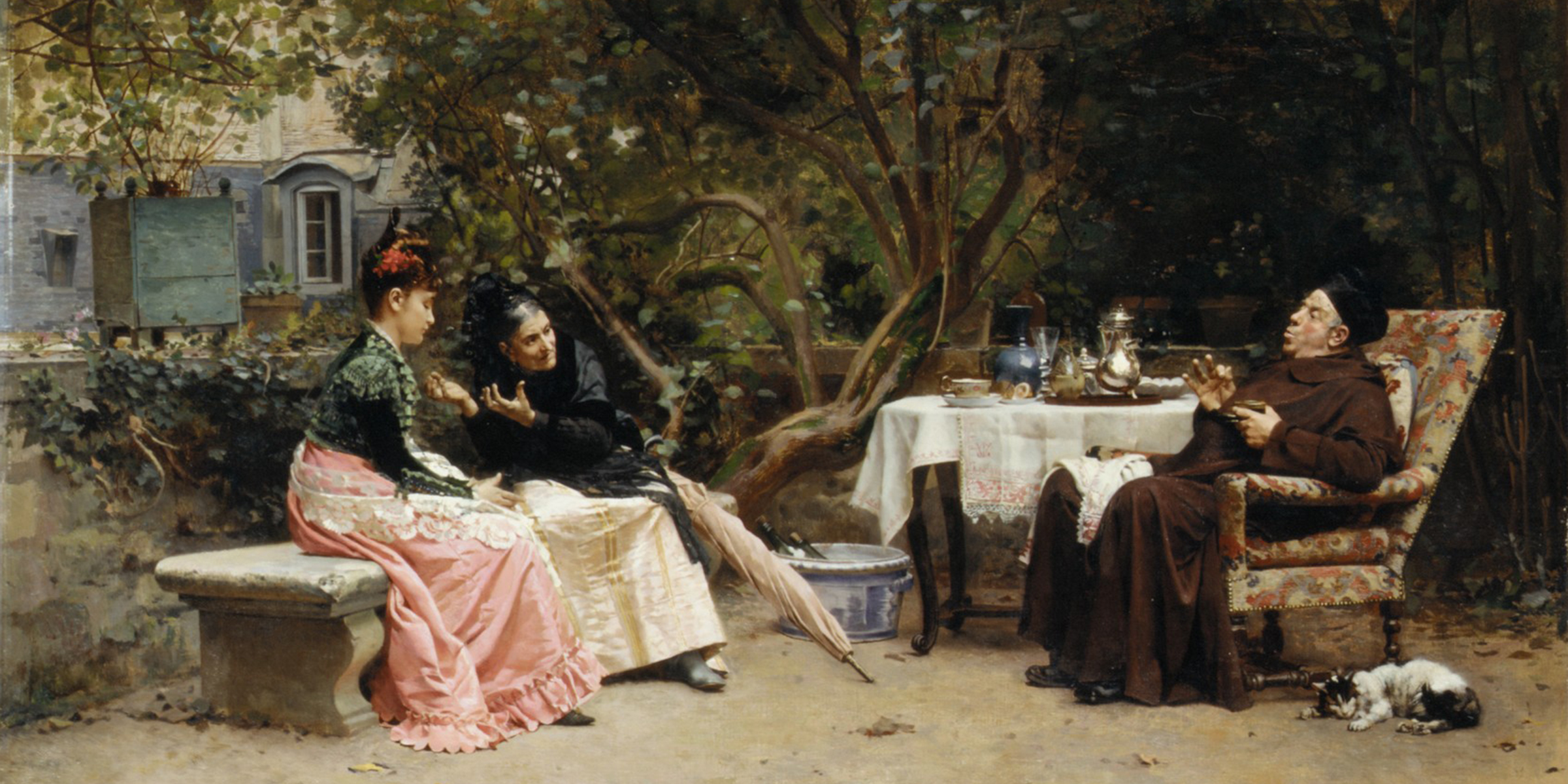
The Reprimand, by Jean-Georges Vibert, 1874. The Metropolitan Museum of Art, Catharine Lorillard Wolfe Collection, Bequest of Catharine Lorillard Wolfe, 1887.
In Summer 1914, the final novel in Roger Martin du Gard’s chronicle of the Thibault family, two friends in the last days of peace discuss the slide to war. One of them challenges us to think anew about the humbling part in history played by Frederick the Great’s favorite officer, General Chance. “If this war materializes, I think the historians—who’ve made so much of Cleopatra’s nose—will ascribe its due importance to the tragic pistol shot at the Figaro office when they’re unraveling the causes of war,” says one friend. “One thing’s for sure…if Caillaux had stayed in power, things would not have come to the pass they’ve got to now.” In August 1914, with France engulfed by the German invasion, the government ordered newspapers to not so much as publish his name: Joseph Caillaux might remind the French of the road not taken—the road to peace.
A century on, the foreground of l’affaire Caillaux—murder, multiple adulteries, courtroom histrionics unthinkable in Britain or the United States—fills our view. Missing is the grim-stakes political struggle in the background. In elections scheduled for the spring of 1914, Caillaux’s Radical Party would join with Jaurès’ Socialists in a puissant coalition likely to win a parliamentary majority. Once in power, it was widely believed, Caillaux would move toward détente with Germany. That’s one reason why, between December 1913 and March 1914, Calmette published the 110 articles, anecdotes, and cartoons attacking Caillaux. Extending from President Poincaré, who spoke of Caillaux in private in terms as bitter as Calmette’s in Le Figaro, to the proto-fascists of the Action Française, who mounted violent street demonstrations against Caillaux the night of Calmette’s murder, the French right hated and feared Caillaux for appealing to the self-interest of the French, above all to their desire to curb a tax-eating arms race with Germany that, from 1910 to 1914, saw defense spending surge by 85 percent.
“The Figaro campaign was implacable,” declared Henriette, testifying on day one of her eight-day trial, which drove the July Crisis, a fuse burning to war, from the front pages. Dressed in a black gown with a V-shape opening baring her white throat, her black cloth hat topped by a dark ostrich feather, her thin white arms encased in black kid gloves, now twisting a black-bordered handkerchief in her hand and now dabbing her eyes, Madame Caillaux, the lone woman in a courtroom of men, spun the backstory of her crime passionnel through the length of the afternoon, reprising her panic—“Every day! Every day!”—as Gaston Calmette pressed his assault on Joseph Caillaux: “I was tortured with fear. I feared my husband would be murdered.”
She also feared her nineteen-year-old daughter would read her sexual history on the front page of Le Figaro. “Madame Caillaux, after all, was an adulteress,” Berenson writes. “She had cuckolded her first husband, ultimately divorcing him to involve herself with a married man who would divorce to wed her.”
Attacks on me will do no harm, and silent contempt is the best answer to them.
—James Monroe, 1808In 1908, her year of ignominy, Henriette divorced Léo Claretie, a literary critic, expecting that Joseph would divorce his first wife, Berthe. But Berthe would not go quietly. Breaking into his desk, she found a letter Joseph had written to Henriette outlining his plan to sue for divorce once he had won reelection in the coming campaign. Fearing harm if it got into the wrong hands, he’d asked Henriette to return it. “There is only one consolation, ” he wrote. “It is to think of my little one, to see her in my arms as at Ouchy (God, what delicious moments!)…A thousand million kisses all over your adored little body.” The political calendar gave Berthe the upper hand. A second “divorce scandal could easily turn [Joseph’s] peasant constituents against him,” Berenson writes. During Henriette’s trial, Berthe testified that she told Joseph, “ ‘Let’s get divorced right away.’ Immediately, he threw himself at my feet and crawled on his knees, begging me not to divorce him.” She agreed—if he broke with Henriette. He agreed—if she burned the incriminating letters (she’d accumulated a cache) in front of his lawyer. She complied, but not before mailing them to her sister, who had them photographed before returning them.
Reelected, Joseph walked out on Berthe, who revenged herself by giving Calmette politically embarrassing letters Joseph had written when he was luring her away from her first husband. One, signed Ton Jo (Your Joe), ran in Le Figaro on March 13. Henriette had long known that Berthe did not destroy Joseph’s letters to her when she was still Henriette Claretie, and now was dead certain Calmette had and would run them. “To publish these letters, or part of them, would be to expose all my intimacy, my dearest secret…It would be to make my honor as a woman naked,” she told the court. She intended no harm to Calmette: “To kill a man—that is a frightening thing, shameful…Would I have renounced…my husband’s love, my daughter’s affection, my pleasant life…to go and kill?…I would have let them publish anything if I’d known this would happen.” She insisted, “I wanted to cause a scandal…and after that it would be very difficult for them to publish the letters.” Yet three days after “Ton Jo” betrayed Berthe’s malicious hand behind Calmette, Henriette hurt her thumb testing a revolver at a gun shop before switching to the Browning and firing a magazine just to be sure it lived up to its billing as “easier to handle…though perhaps more dangerous.” That afternoon she carried it in her muff to her showdown with Calmette.
Did Madame Caillaux murder Gaston Calmette? No, answered eleven of the twelve men on her jury. They believed her—she only meant to “cause a scandal”—but, malchance, Calmette fell to the floor where she aimed. The jurors accepted that she feared Calmette was about to publish intime letters from Joseph that would disgrace her in front of her daughter. Paris juries favored leniency for women whose honor had been violated—wives who killed husbands caught in the act, for example. Caillaux’s jury found convincing the defense’s picture of a woman overcome by volatile emotions—“the victim of an inconceivable overexcitement”—her frail-sex reason was too weak to resist. With newspaper hawkers outside the courtroom shouting that Austria had declared war on Serbia, perhaps, too, the jurors were stirred by the closing appeal delivered by her lawyer, Fernand Labori, who had defended Alfred Dreyfus. Preserve your anger “for our enemies without,” he urged the jury. It was time for the French people to “proceed united as one…toward the perils that threaten us.” To a nation at war seven days later, Poincaré echoed Labori’s words: France would “be heroically defended by all her sons; nothing will break their sacred union” until they had driven the invader from their land.
The jurors were also swayed by the star of the trial, Joseph Caillaux, who, unspooling his heart by the yard, commanded the courtroom. Gallantly, he blamed himself for ignoring Henriette’s distress—plucking out his monocle to dry a tear. Declaring the impossibility of a life without love, he voiced hour-eating devotion to Henriette (who gasped and cried and even fainted on cue). Caillaux spoke with such emotion that British reporters covering the trial could not believe their ears. Such words would be spoken in England, one wrote, only on stage—in a French play.
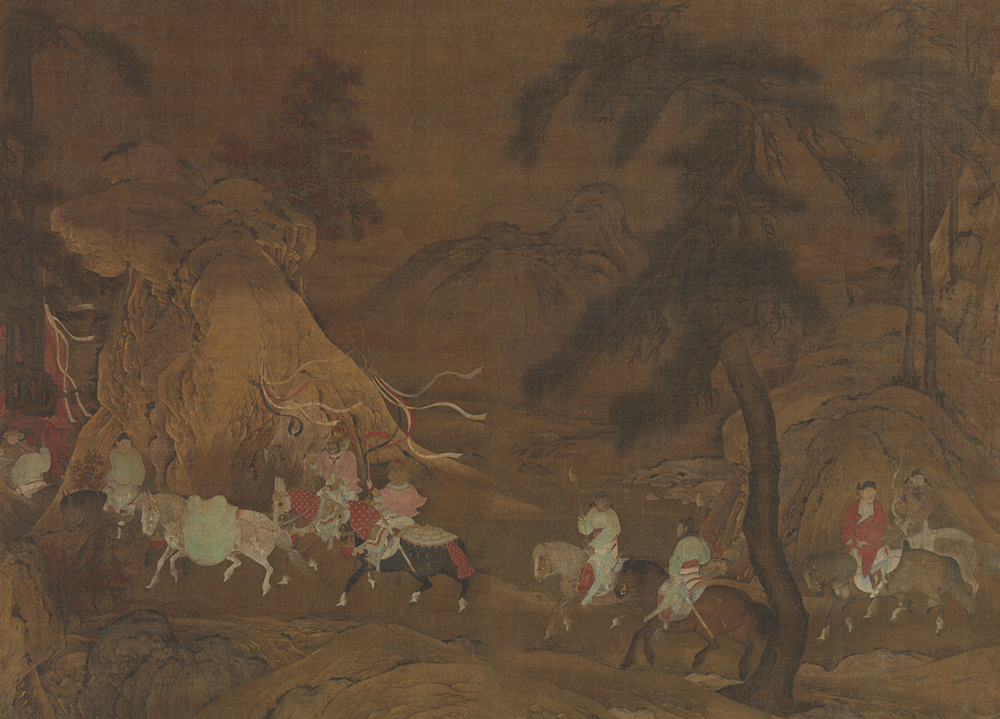
Emperor Xuanzong’s Flight to Shu, mid-twelfth century. The Metropolitan Museum of Art, Rogers Fund, 1941
Caillaux the lover alternated with Caillaux the blackguard. In a tactic that would have been ruled out of order in Anglo-Saxon courtrooms, he savaged the reputation of Gaston Calmette, transforming the trial of an accused murderer into a trial of her victim. For example, on the basis of hearsay from dubious sources, he charged that Calmette had taken bribes disguised as health-spa advertisements from the government of Hungary, with which, in a matter of days, France would be at war. Caillaux’s ardor, eloquence, and ferocity might have influenced any set of jurors. But these weren’t any set of jurors.
Every month, from a sealed wooden box containing the names of three thousand Parisians, a six-judge panel pulled seventy-two names to sit as jurors. The box was then publicly resealed. On May 21, 1914, the bailiff dropped the box as he carried it into the courtroom. When he handed it to the judges, the seals were found to be broken. “No one could recall such a circumstance,” write the historian Benjamin F. Martin. “Had the seals broken when the box hit the floor? Or had someone tampered with the names inside and then contrived the bailiff’s accident?” After anxious discussion, the judges decided to pull the seventy-two names for July. Of those picked, court records reveal, “almost every one is identified as politically sympathetic to Caillaux.” So was Judge Louis Albanel, a “close friend of the Caillauxes,” who let Caillaux virtually conduct the trial by himself.
The astounding not-guilty verdict after less than an hour of deliberation, Judge Albanel’s obvious bias, Caillaux’s blackening the reputation of the dead editor of a respectable nationalist paper—outside the Palais de Justice, rival mobs protested and celebrated these outrages. Caillaux haters shouted, “Assassin! Assassin!” at Caillaux supporters, many of them Corsican toughs imported by Caillaux, who shouted back, “Vive Caillaux!” Outside Caillaux’s house, where he was holding a reception for his friends, crowds chanted, “Death to Caillaux!”
Before the trial, Poincaré conceded that if the jury returned a verdict of not guilty, he must make Caillaux premier. But that was in a lost world. With Austria at war, Russia mobilizing, and German troops entraining for the Belgian and French frontiers, Caillaux, the man of peace with Germany, could not lead France in war. In “a perilous moment of impending war,” writes Berenson, “at a time when France endeavored to re-create itself as one holy family…Joseph Caillaux had come to represent the antithesis of the values embodied in the union sacrée.”
What of Caillaux’s putative partner in government, the matchless orator and anti-militarist—what of Jean Jaurès? Three days after the Caillaux verdict, he learned at the foreign ministry that Germany had given Russia two hours to cease mobilization. “Everything is finished. There is nothing left to do,” a colleague said. Jaurès, the socialist of the will, would concede nothing to inevitability. That evening he went to the offices of L’Humanité to prepare an appeal to the French people to save the peace. “I’m going to write a new ‘J’Accuse!,’ ” he declared, invoking Zola’s philippic against the persecution of Alfred Dreyfus. “I will expose everyone responsible for this crisis.” He broke from his writing to enjoy a late dinner with friends at a café in Montmartre. It was a hot night, and the café windows were open onto the street. At nine forty a young nationalist fanatic, Raoul Villain, crossed the street and shot Jaurès twice in the back. Minutes later Jaurès died. Villain belonged to a revanchard group allied with Action Française, whose newspaper, fixing a bull’s-eye on Jaurès, slandered him as a German agent. “One day in July,” Anatole France wrote, “ignoble calumnies transformed an imbecile into an assassin.”
After Calmette’s murder Villain had bought two revolvers. On the handle of one, he had carved the initial J, and on that of the other, C.
